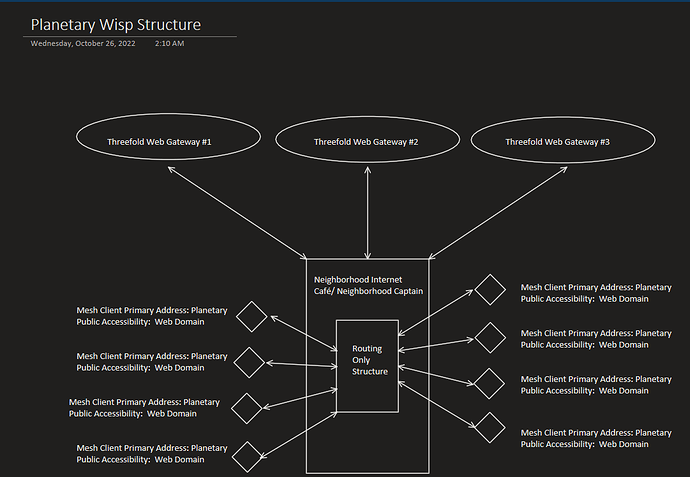A Decentralized Neighborhood I.S.P Concept Built For Threefold
This document is meant to serve as a thought provoking assessment of the current state of the network and how it could be used in its current state to allow for the develop of neighborhood sized networks to increase the accessibility of the internet for underserved populations. This document is theoretical and while many of these concepts have in production examples available for assesment the overall viability of this plan, it is generally untested.
I also think it is very important to acknowledge the individuals truly responsible for this plans exsistence as i am simply putting together the pieces of decentralized work already available.
- The group responsible for the develop of the model for hosting Web Gateways that bridge yggdrasil/planetary to the internet are the people from Mashmesh
- The group responsible for the GUI management interface of Web Gateways are the Guys from the Cockpit Project
- The grout responsible for Opnsense
- The group responsible for OpenWrt
The intent of this plan is to provide a goal of 200 Mbit internet connections and on grid VPS hosting to ten homes/business in proximity to a host’s site as these users primary means of connecting to the internet. This network will provide encrypted communications between the end users home routers and a secure web server hosted on grid that serves as the interchange between your decentralized network and the larger body of the internet. The basic concept of this network represented visually,
As shown in this diagram, The “Web Gateways” are the heart of the machine. The web Gateways serve a few different purposes.
-
Their primary role of the gateway is to allow the exachange of end user data to the internet, outside of the Neighborhood Host’s network, This is accomplished by maintaining all communications between the Neighborhood host, end users and the gateway within the Planetary network. This outsources the processing power required for the encryption and decryption of gateway traffic and prevents any monitoring of the content of the traffic being transmitted across the network and limits the visible connections seen by the ISP to the connections to the on grid web gateways.
- Instructions for basic web gateway setup
The next Level is the Neighborhood I.S.P’s Equipment, this model emphasizes the minimal amount of equipment needing to be purchased and deployed for initial functionality,
-
The model supports both wireless and wired transmission of data between mesh clients. equipment availability is very location specific, this model allows for the use of bare metal hardware with software that is openly available such as Openwrt and Opnsense. The principal equipment required by a Neighborhood captain would include a Router, A switch and the equipment nessecary to reach the homes around them with a speed that is relevant to their area whether that be wireless radios or copper connections.
- Documentation on a setting up a neighborhood mesh
The final level of the network is the End User Access Point, this is device designed to receive the connection from the neighbothood hosts routing infrastructure and produce a usable private subnet on the interface
- these can range from low-cost devices that can be powered by a solar cell like the GL-INET MT1300 “beryl”, all the way up to a full server depending on the capacity needed, the important information is these can be made with readily available equipment that already ships running openwrt. The principal equipment required for a mesh client location is a router and the equipment required to reach the closest mesh client whethere that be wireless or by copper cabling and a device capable of accessing a remote desktop or performing the task they into, based on network strength.
- Instructions for building a D.I.Y Mesh node from Massachusets mesh.
While there are groups already deploying networks like this the Threefold grid adds a layer of value and accessibility that is unmatched currently. the decentralized compute power that is provided allows for those in underserved areas to have on demand access to nearly unlimited compute resources, with only the equivalent equipment of a thin client, if all they require is acess to the web for information, schooling, news or entertainment this may be all they require. This also allows for people requiring greater compute to invest in hosting their primary workload in the cloud, on the grid. Giving them the benefits of the internet connection, reliability, and performance of machine that may be in a different country then they are while minimizng their onsite investments.
-
For a business this may represent having access to host databases or web servers or being able to provide a more interactive experience to customers.
-
For a school this may reprsent being able to deploy vms to teach students, and only pay for them for as long as they need them with no required licenses or additional “commercial fees”.
-
For an individual this may represent access to a cad software, or photoshop.
I truly hope that I have drafted this in a way that it is easily understandable and gives the community some ideas on how Threefold can be molded from the substrate that exist today into a technology that will usher in the next digital age.
-ParkerS/Drew Smith, Just an Idealistic Farmer.


 , you’re just wrong, my project is entirely viable where I am deploying, I’m doing it for me, I offered you it as something that may be of use to you, clearly it’s not, now please go away.
, you’re just wrong, my project is entirely viable where I am deploying, I’m doing it for me, I offered you it as something that may be of use to you, clearly it’s not, now please go away.